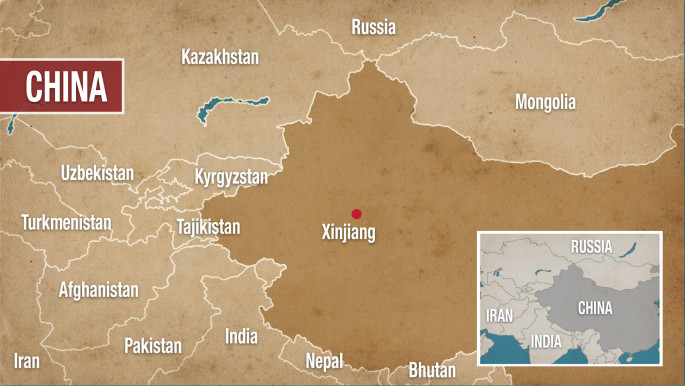China steps up diplomatic whitewash of Uighur re-education camps
Since December, at least three groups of foreign diplomats have visited what China calls re-education and training facilities in the autonomous north-western province.
The country's foreign ministry said last week that diplomats from Pakistan, Egypt, Russia, Cuba, Cambodia, Senegal and Belarus had visited Xinjiang.
The government has now invited China-based diplomats from Saudi Arabia, Morocco, Algeria, Lebanon, Egypt and others for a similar trip to the province next week, diplomatic sources told Reuters.
Lebanese foreign ministry sources said Lebanon would not participate.
China's foreign ministry confirmed to Reuters that the government was inviting foreign diplomats to the region but did not give further details.
"We believe this trip will help increase their understanding and knowledge of Xinjiang," it said.
Twitter Post
|
"Xinjiang is open, and we believe that anyone who is unprejudiced can objectively see the success of Xinjiang's development."
Xinjiang officials did not respond to requests for comment.
In January, China took a small group of foreign reporters to the internment camps on a chaperoned visit which marked the first time non-Chinese media had been given access.
China 'rattled' over backlash
The northwest Xinjiang region of China, where most Uighurs live, has been under heavy police surveillance in recent years, after violent inter-ethnic tensions.
Nearly one million Uighurs and other Turkic language-speaking minorities in China have reportedly been held in re-education camps, according to a UN panel of experts.
Diplomatic sources told Reuters that China is becoming "very rattled" about the international backlash against the camps and is implementing a diplomatic campaign to manage its image abroad.
Most Muslim countries have been generally silent about the camps, but in February Turkey condemned China's treatment of its Muslim ethnic Uighur people as "a great embarrassment for humanity".
"It is no longer a secret that more than one million Uighur Turks, - who are exposed to arbitrary arrests - are subjected to torture and political brainwashing in concentration centres and prisons," Turkey's foreign ministry said.
China is keen to prevent other Muslim countries from joining Turkey's condemnation of the camps, a Beijing-based diplomat told Reuters.
Several European diplomats have expressed frustration at the lack of willingness by Muslim countries to speak out about China's policies in Xinjiang.
 |
|
| [Click to enlarge] |
The Universal Periodic Review by the UN Human Rights Council in January saw widespread criticism of China's treatment of the Uighur community.
Last year, a dozen ambassadors from Western countries wrote to request a meeting with Xinjiang's top official to discuss their concerns but no meeting was scheduled.
No Muslim country signed the letter, which was circulated widely, diplomats said.
The UN has cited credible reports that about one million Uighurs are currently being held in internment camps, where they are forced to denounce Islam and take part in indoctrination-like activities such as singing communist songs, learning the history of communist China and praising the president.
Those who disobey reportedly are subject to torture such as solitary confinement, deprivation of food and water and sleep, and even waterboarding.
The repression of Uighurs in the far-northwestern province Xinjiang is not confined to imprisonment and alleged torture.
Xinjiang has over the past years become a testing ground for high-tech surveillance technology. Authorities have collected masses of biometric data from Chinese Muslims in the province and heavily restricted residents’ freedoms of movement and activity.
Chinese authorities justify these actions as necessary measures to stamp out separatist "terrorist" groups in the region.
Agencies contributed to this report.



